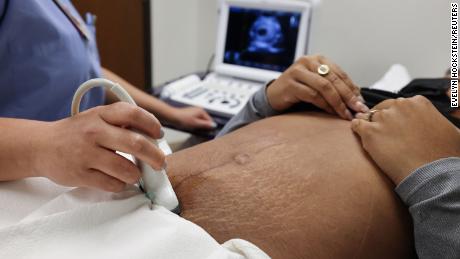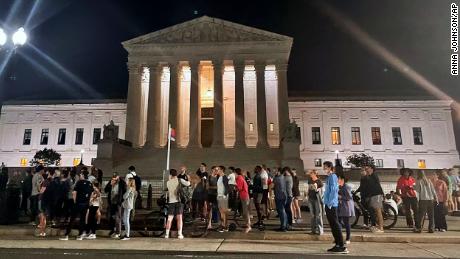On paper, Esche, 28, and her now fiancé seemed to be perfect candidates for parenthood, she tells CNN: Esche is a business owner, her fiancé is a lawyer and the two own a home together in Nashville, Tennessee.
But the results of a positive pregnancy test last June didn’t bring the excitement they expected. They didn’t feel ready or properly equipped to welcome a child into the world, Esche says.
So, the couple made the difficult decision to get an abortion at a local clinic when Esche was five weeks pregnant.
On Monday evening, Esche checked her phone after a networking event and saw a Snapchat from a friend. The post shared the news that a draft of a majority opinion from the Supreme Court, published by Politico, would strike down Roe v. Wade’s holding of a federal constitutional right to an abortion.
The opinion, which is not a final decision, would be the most consequential abortion decision in decades and transform the landscape of reproductive health care in America. The final opinion isn’t expected to be published until late June, and language and votes can change before its formal release.
As supporters of abortion rights rallied outside the Supreme Court building Monday night, Esche, reaching a breaking point, found herself in bed crying with her fiancé as the couple decided to speak out about their own experience, she says.
“I felt like my silence was almost being complicit,” Esche said. “And if more women had spoken up sooner, maybe we wouldn’t be in this position … maybe I wouldn’t have felt so alone, and I don’t want anybody to feel the way that I felt during that time.”
The couple had only told a few close friends about their abortion. Their parents were not aware.
Although she’s confident with her decision, Esche says the past year has been marked by isolation. She doesn’t know many others who can empathize with her, and that took an emotional toll on her.
The couple decided now was the time to speak up.
“I’ve kept this private … it is PERSONAL and in no shape or form involves anyone but myself, my partner, and my doctor — but having an abortion was the best decision and I’m so grateful to have had that option. My heart breaks for the women who have had this right taken,” Esche tweeted Monday night.
Then she put her phone down and went to bed.
When she woke Tuesday, she was taken aback reading direct messages from others she had reached with her story.
“I just cried,” she said. “But not sad tears, just incredibly happy and just relieved. I feel like this weight has been lifted.”
Bonding over a difficult decision
Celia Gregory, 36, was one of those close friends Esche confided in. Gregory, like Esche, also had an abortion, in 2005, but didn’t publicly share her experience for another 15 years.
The women met while volunteering four years ago and bonded over their love of music. Having read Gregory’s story online, Esche reached out to talk last summer.
“I’m grateful that if Taylor is the only person that ever read what I put it out there and then was able to feel comfortable approaching me in her time of need, then it was worth it,” Gregory said.
Now that Esche had chosen to go public with her story, the women found themselves bonding again.
Esche grew up in Alabama, went to Catholic school, and she and her fiancé come from conservative families, she says.
“I’ve had all that drilled into my head for a long time,” she said. “And I really struggled with what I felt comfortable with, despite knowing that at the end of the day, it is my decision, it’s my body, I have the autonomy.”
When Esche called her fiancé to tell him about the positive pregnancy test, he was immediately supportive, she says. The two decided whatever decision they made would happen together. She says she knows that type of unconditional support isn’t something people can take for granted.
And that wasn’t the case when she told her family Tuesday morning.
Her mom started crying and said she’d call her later, Esche says.
“I told her I loved her and that while she doesn’t have to support my decision, I hope she does accept it,” she said.
Tuesday afternoon, Esche spoke by phone to her brother and mother, who was adopted from Korea, more in depth and addressed any questions they had about her decision.
“Adoption is the reason my brother and I exist and that makes things a little bit more complex for them to swallow,” she said. “I’m trying to have some grace with them because they’ve had no time to process this unfortunately, whereas I’ve had almost a year.”
Adoption wasn’t an option for Esche and her partner because, had she carried the baby to term, she knew she wouldn’t have been able to part ways with it, she says.
“I think that it was a clear indicator to me that if I had had that conversation where I went to my mom, I think I would have had a much harder time making that decision and would have felt much more guilty,” she said. “Whereas this way, I was able to make a decision clear headed, on my own terms and not faced the guilt that my family would have imposed on me.”
A similar decision across the country
Like Esche, Isabel Serafin of Loveland, Colorado, 50 miles north of Denver, was faced with a similar decision when she found out she was pregnant at 12 weeks.
Her choice to have an abortion at age 19 was both the hardest and easiest decision she’s ever made for herself, she says.
At 19, Serafin says she was in a long-term relationship but had been sexually assaulted and wasn’t certain who the father was. She had little money and was battling substance abuse issues, all factors that she felt made her unprepared to be a mother.
Serafin said it was incredibly hard knowing many are struggling with infertility — her own mother experienced seven miscarriages before carrying her and her twin sister to term — but adoption was just not an option for her either.
“I could not imagine carrying a baby to term spending nine months developing something in my body, getting emotionally attached to it, and then giving it away, or worse, having to raise it myself with no resources,” she said.
Serafin, now 22, says she chose to make her abortion story public on social media for the first time Monday night after grappling with “absolute rage” over the court’s draft opinion. She says the draft’s release was a wake-up call for her.
“I feel like the time for being silent and keeping things like that to myself has passed,” she said. “Abortions are so common … and when I got mine I didn’t know a single person who had ever gone through that procedure and I remember feeling so alone…I feel like we can’t afford to be silent about it anymore.”
While the preliminary opinion has no immediate effect on abortion access, millions of Americans are anxiously awaiting what’s to come.
“We are not safe anymore,” Serafin said. “Our rights as women, as individuals are under direct attack. This is not the last piece of radical legislation that will be addressed by the courts and we need to be prepared for the next thing that’ll be struck down, whether it’s LGBTQ marriage, interracial marriage, birth control, anything … because at this point they couldn’t be making it more obvious for us that that’s what’s next.”
Legislators in 13 states have already passed “trigger laws,” which are bans designed to go into effect if Roe v. Wade is overturned. In some cases, the law requires an official such as an attorney general to certify that Roe v. Wade has been struck down before the law can take effect.
“Unfortunately, in states with trigger laws, I think we’re about to have a very dim future,” Esche said. Tennessee, where Esche lives, is one such state.
With Esche’s mom and brother, she believes acceptance will come in the future, but she is prepared that their support may not accompany it.
Ultimately she hopes that her mom can “learn to speak on it (her abortion) without attaching guilt.”
After a week of emotional conversations with her family, Esche and her fiancé are set to have more with his parents this weekend.









